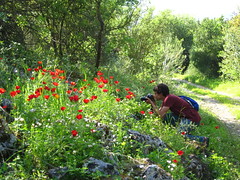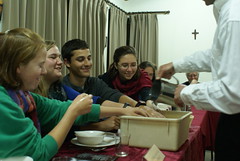 Last week was packed with opportunities to learn more about Israeli culture with the Oranim program. We stayed in Kibbutz Ramat HaShofem, one of the first kibbutzim set up in Israel. The original kibbutz system was set up with a mix of socialist and zionist ideals, focused on communal living. This kibbutz has lost many of these original ideals, but still provided a nice setting and guest house for our group to meet and discuss our new perspectives of Israeli culture.
Last week was packed with opportunities to learn more about Israeli culture with the Oranim program. We stayed in Kibbutz Ramat HaShofem, one of the first kibbutzim set up in Israel. The original kibbutz system was set up with a mix of socialist and zionist ideals, focused on communal living. This kibbutz has lost many of these original ideals, but still provided a nice setting and guest house for our group to meet and discuss our new perspectives of Israeli culture.
A highlight for many of us was the several “mifgash” (or planned conversations) where we had opportunities to meet with Israelis near our age. On the first evening, we had a chance to talk with four Israeli soldiers. Military service is mandatory for all Israeli youth after high school, which is definitely a contrast to my pacifist upbringings. By the end of our conversation, I was finally able to look past their uniform and gun to see these soldiers as people.
One of my favorite speakers this week was Noha Khativ, an Arab Israeli who grew up as a minority in a Jewish community. She helped set up an organization called Hand in Hand, which has created four bi-lingual schools for Arab and Israeli children within Israel. The classes are taught in both Arabic and Hebrew, which allows the kids to communicate with one another and learn about the other students’ cultures and religious traditions. Not only do the children have opportunities to make friends with one another, but their parents and families are given opportunities to interact as well. These relationships help build understanding between Arabs and Israelis. Hopefully these children will grow up questioning why they are told to hate and fear “the other” and rather build on the relationships they have made through Hand in Hand.
We also met with Tzvika and Ayelet Shahak, whose daughter Bat-Chen was killed in a suicide bombing attack on her 15th birthday in Tel Aviv. Their strength in spreading Bat-Chen’s dream for peace gives me hope for the entire region. Bat-Chen’s Diary has been published in six languages, and I was impressed with her messages for peace even at a young age. Rather than just grieve and become bitter about their daughter’s death, Tzvika and Ayelet converse with other bereaved families, both Israeli and Palestinian, about ending violence.
Other topics of conversation from this week included: the conflict between secular and religious Jews; the post-Holocaust Jewish mindset; and Arab identity as a minority within Israeli society. Being here and discussing Israeli issues has helped me understand the Israeli mindset, however complicated it may be.
 Our group also had plenty of opportunities to bond this week over endless cups of tea, random evening card games, a delicious Shabbat dinner in an Israeli home, group presentations on the Arab/Israeli conflict, and a fun-filled Talent Show/Game Night. I am impressed with how much the group has matured and grown since the beginning of the semester, and I consistently gain new insights from them through conversation and discussion. I’m looking forward to our upcoming week in Nazareth and hiking the Jesus Trail to the Sea of Galilee!
Our group also had plenty of opportunities to bond this week over endless cups of tea, random evening card games, a delicious Shabbat dinner in an Israeli home, group presentations on the Arab/Israeli conflict, and a fun-filled Talent Show/Game Night. I am impressed with how much the group has matured and grown since the beginning of the semester, and I consistently gain new insights from them through conversation and discussion. I’m looking forward to our upcoming week in Nazareth and hiking the Jesus Trail to the Sea of Galilee!
-James Souder